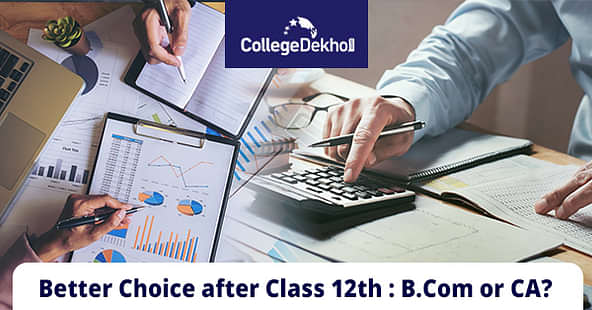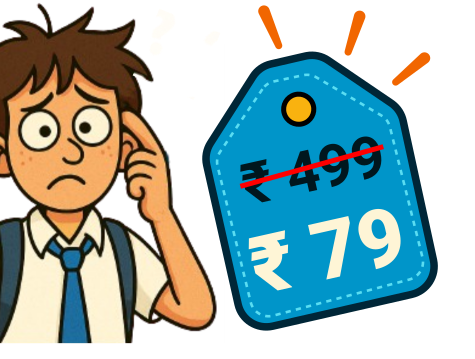There are many similarities and dissimilarities between CA and B.Com course. The comparison of the courses below will help with your contemplation of choosing between B.Com and CA after Class 12.

The changing dynamics of the Finance sector demand individuals excel in jobs other than the conventional roles that professionals have been doing. But, the fast-paced corporate world has altered the outlook of individuals towards time-taking processes to achieve the final goal. In the modern era of shortcuts, some people would prefer programmes offering reputed job profiles in less duration whereas, some would prefer programmes offering Finance profiles with higher packages and reputations, taking more time. This conflict raises the question ‘Which is better after Class 12 - CA or B.Com?’
To answer such a question, we need to keep in mind certain important factors. An individual will not be sure of either CA or B.Com after their Class 12 without knowing deeply about the subjects and making an appropriate comparison of all aspects. Candidates who are puzzled and in search of an answer have landed on the right page. This article provides you with a detailed comparison between CA and B.Com regarding syllabus, job aspects, duration of the course, salary packages, etc. Candidates who are aspiring to become a CA can go through the article to get relevant information and understand whether they should directly pursue CA after their 10+2 or should wait to complete their B.Com and then apply.
Also Read: B.Com vs CS: Which is a Better Option After Class 12?
About B.Com and CA Course
Where B.Com (Bachelor of Commerce) is an undergraduate programme, CA (Chartered Accountancy) can not be put under one level. There are different entry routes to pursue CA. One requires candidates to pass intermediate education, whereas the other requires them to hold a Bachelor’s degree (preferably in Commerce). Here are the links that would help you understand the courses better.
Bachelor of Commerce is a 3-year undergraduate degree offered by many colleges/ universities in India. B Com is one of the most well-known commerce courses among students. To take admission into the B.Com programme, candidates have to first complete their Class 12th from a recognized board. If candidates pass their Class 12 in the Commerce stream with or without Mathematics, then they are in an advantageous position. Students can take admission into colleges/ universities based on their marks in their qualifying board examination or they might have to appear for entrance exams. Some of the entrance exams that B.Com aspirants have to appear for are DUET, IPU CET, NPAT, BHU UET etc.
Chartered Accountants are professionals who look after the auditing, accounting, financial evaluation, and taxation for an individual or an organization. An individual gets the CA title from ICAI only when he/ she is qualified to handle the accounting and taxation-related issues of a business enterprise. A candidate can pursue a Chartered Accountancy course either through the Foundation Course Route or the Direct Entry Route under the Scheme of Education and Training.
B.Com Vs CA: Eligibility
In the table below, you can find differences and similarities between the eligibility criteria for both B.Com and CA.
Eligibility Criteria for B.Com | Eligibility Criteria for CA (Foundation Route) | Eligibility Criteria for CA (Direct Entry) |
|---|---|---|
|
|
|
Telnagna Shcool board students who be taking the class 12 examination can check TS Intermediate Syllabus 2023-24 and TS Intermediate Time Table 2024 to prepare for the board exam as well as the entrance examinations.
B.Com Vs CA: Duration
As B.Com is an undergraduate degree course, the duration is less compared to the CA programme.
B.Com Duration | CA Duration |
|---|---|
|
|
B.Com Vs CA: Syllabus
The CA syllabus includes subjects from Foundation Course, Intermediate Course, and Final Course whereas B.Com includes subjects that are taught for 3 years.
B.Com | CA |
|---|---|
Accounts | Principles and Practices of Accounting |
English | Business Law & Business Correspondence and Reporting |
Maths | Business Mathematics and Logical Reasoning & Statistics |
Economics | Business Economics & Business and Commercial Knowledge |
Management | Accounting |
Environment & Public Health | Corporate and Other Laws |
Business Communication | Cost Accounting and Financial Management |
Computer Applications & IT | Taxation |
General Awareness I | Auditing and Assurance |
General Awareness II | Enterprise Information System & Strategic Management |
Income Tax Laws | Advanced Accounting |
Banking & Insurance | Financial Management & Economics for Finance |
Microeconomics I | Financial Reporting |
Financial Markets & Institutions | Strategic Financial Management |
Indian Economy | Corporate Laws and Economic Laws |
Corporate Accounting-II | Advanced Auditing and Professional Ethics |
Elements of Company Law-II | Strategic Cost Management and Performance Evaluation |
Managerial Communication | Electives |
Indian Banking System & Central Banking | Direct Tax Laws and International Taxation |
Elements of Company Law-II | Indirect Tax Laws |
Cost Accounting | - |
Entrepreneurship | - |
Marketing Management | - |
Contemporary Indian Economic Issues & Policies | - |
B.Com Vs CA: Job Prospects
Although the field is the same, the job profiles and roles for a B.Com graduate vary big times than that of a CA. Candidates can have a look at the comparison below.
Options | CA | B.Com |
|---|---|---|
Fields and Areas |
|
|
Job Profiles |
|
|
B.Com Vs CA: Salary Package
The salary package is subject to change depending on the company and job profile one works as.
Salary Package After Pursing CA | Salary Package After Pursing B.Com |
|---|---|
|
|
CA After 12th Vs CA After B.Com
Students who are usually from the Commerce stream often find themselves in a situation where they think ‘Should I pursue CA directly after Class 12th or after B.Com?’ If you are from the same stream, then you might have also thought about this and got worried and anxious at the same time. We have listed below some pointers that will help you to make your decision.
- Duration: Before starting out with any of the courses, you have to be sure of the duration that has already been mentioned above. Through one route, you will only have to dedicate 4.5 years to the CA course whereas, through the direct entry route, the CA course might take only three years but you also need to take into account the three additional years that you commit to completing your graduation.
- Prospects: The college period is considered the most important part of your life. You experience a lot and get to learn a lot as well. You get the opportunity to explore your talents and improve your skills by participating in extra-curricular activities during the college period. If you are not very prepared to experience such things, then, you can go for the course right after Class 12. Otherwise, CA after B.Com would be the better option.
- Options: It is always recommended to have an alternate career option. During your college life, you would surely be indulging in a lot of co-curricular activities, which might lead you to a different career interest. On the other hand, if you are a hundred per cent sure of building a career as a CA, then the Foundation Route would be a better fit for you.
Also Read: BBI vs B.Com: Which is a Better Option After Class 12?
Top B.Com Colleges in India
Check out the list of top B.Com Colleges in India here:
Name of the College | Average Fees |
|---|---|
INR 25,000 (annually) | |
INR 65,000 (annually) | |
INR 40,000 (annually) | |
- | |
INR 46,000 (annually) | |
INR 1Lac (Annually) |
Well explore the colleges mentioned above and if you feel like knowing more about them or want to apply, fill out our Common Application Form (CAF) and our education experts will guide you through the entire admission process. If you have any questions, you can avail of FREE counselling by calling on our toll-free number 1800-572-9877.
Related Articles
Hope that the above-mentioned information helped you and cleared your doubts about the same. If you have any questions, feel free to head to our QnAZone. For more such content, stay tuned to CollegeDekho .
Are you feeling lost and unsure about what career path to take after completing 12th standard?
Say goodbye to confusion and hello to a bright future!

FAQs
Candidates who have pursued B.Com from top colleges and have apt skills for the job role can even bag packages as high as 37 LPA. The lowest package can range from 2 - 3 LPA. graduates who opt for Investment Banking as a career can begin with a great package of 16 - 18 LPA. You should keep in mind that with experience, your salary will also increase. An Accountant can get around INR 2,50,000 LPA, a Finance Consultant will get INR 10,00,000 LPA whereas a Banker can earn INR 3,70,000 LPA.
Some of the best B.Com colleges in India that candidates can think of for getting admission are Hindu College in Delhi, Loyola College in Chennai, Christ University in Bangalore, St. Xavier's College in Kolkata, Shobhit University, Meerut, Amity University, Lucknow, etc. To get admission into the best colleges, candidates have to make sure that they have the appropriate percentage required by various colleges.
The salary package of CA is definitely high but the job also requires appropriate experience. The average salary for a fresher at big firms like KPMG, Deloitte, and EY ranges from 6 - 8 lacs per annum. The package keeps rising with experience. A person with at least two years of experience in the field can get a package as high as 25 LPA at the same firm.
For Foundation Route to the CA course, candidates must have finished their Class XII examination. The exam must have been completed by a recognised board. ICAI has not specified minimum percentage criteria for the route as such. Candidates must hold either a Graduate or Postgraduate degree from a recognised university. Those who have pursued a Bachelor’s degree in Commerce must have scored a minimum of 55% marks. Individuals who have pursued a Bachelor’s degree in a subject other than Commerce must have scored at least 60% marks.
Candidates who have completed their graduation in B.Com can work as an Auditor, Banker, Tax Consultant, HR, Accountant, Financial Analyst, Business Consultant, Investment Banker, etc. Those who want to study CA and complete the final exam can work as a Chartered Accountant, Cost Accountant, Actuary Professional, Company Secretary in Practice, Chartered Engineering, Auditor, Partner at a Consultancy Firm, Civil Servant, Investment Banker, Entrepreneur, etc.
Before taking up the CA course, you must be aware of the subjects taught to the students. The topics taught are Principles and Practices of Accounting, Business Law & Business Correspondence and Reporting, Business Mathematics and Logical Reasoning & Statistics, Accounting, Corporate and Other Laws, Cost Accounting and Financial Management, Auditing and Assurance, Enterprise Information System & Strategic Management, Advanced Accounting, Financial Management & Economics for Finance, Strategic Financial Management, Advanced Auditing and Professional Ethics, Direct Tax Laws and International Taxation, etc.
The minimum time period of the CA course for candidates who will be pursuing it directly after their Class 12 is 4.5 years. For candidates who join the programme through the Direct Entry Scheme i.e., after Graduation, the duration of the course is 3 years. Previously, there was a restriction on the number of attempts for taking the CA exam, but now it has been removed and there is no maximum duration for the CA course.
To take up B.Com, candidates have to pass their 10+2 or equivalent from a recognised board. Although the minimum percentage requirement varies according to the college, there are some colleges that take an entrance exam for the B.Com course. The B.Com cut-off for colleges that are affiliated with Delhi University can go as high as 99% whereas, some colleges require a minimum of 50% marks. Students can take admission into colleges/ universities based on their Class 12 scores or they might have to appear for entrance exams. Some of the entrance exams that B.Com aspirants have to appear for are DUET, IPU CET, NPAT, BHU UET etc.
Chartered Accountants are professionals who look after the auditing, accounting, financial evaluation, and taxation for an individual or an organization. An individual gets the CA title from ICAI only after they are capable of handling taxation-related problems. On the other hand, the Bachelor of Commerce (B.Com) is a 3-year undergraduate degree that is very popular among students who are from the Commerce stream.
Was this article helpful?




















Similar Articles
SRCC CUET Cutoff 2025: Check Expected Cutoff based on Previous Trends
Top 10 Commerce Colleges in Delhi University
Best Career Options after BA Economics: Check Scope, Job Profile, Salary and Courses
Know the Difference Between B.Com and B.Com (Hons.)
Maharashtra B.Com Admission 2025: Dates, Application Procedure, Fees, Selection
Best Courses after 12th for Commerce Students